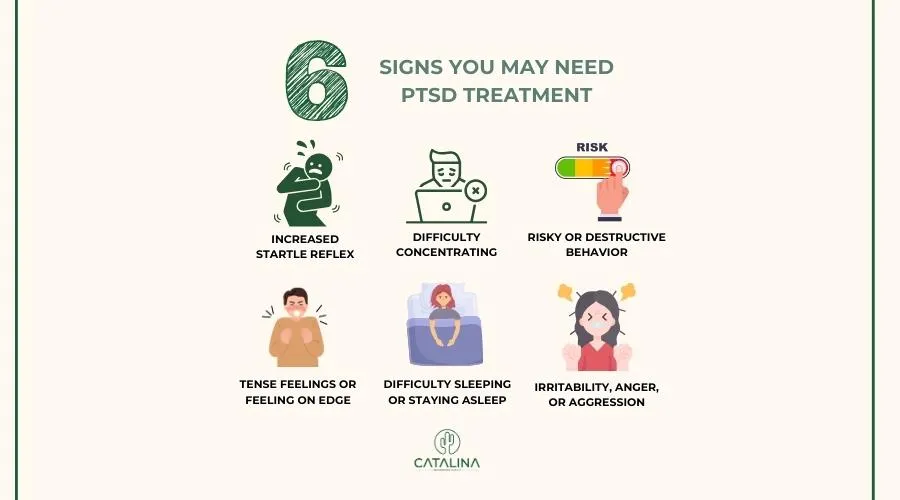The Methods for Effective PTSD Treatment at Catalina
The effects of post-traumatic stress disorder (PTSD) are far-reaching. A PTSD treatment center can help those who are dealing with the effects of this crippling mental health disorder.
PTSD treatment centers provide a quiet, isolated environment dedicated solely to the client’s mental wellness. In this safe space, you may take a break from the outside world and the stresses that may be triggering your PTSD symptoms so that you can focus on your rehabilitation.
Keep reading to find out more about what makes an effective PTSD treatment center and learn how choosing Catalina Behavioral Health can help you into a new way of life!
24 Hour PTSD Treatment Helpline – Call Now!
What is Trauma? When Does Trauma Become PTSD?
Alarming, potentially harmful, or otherwise terrifying experiences qualify as traumatic incidents. Strong feelings are a normal and healthy response to traumatic experiences. In some cases, victims of trauma make a full recovery in a few days or weeks.
Some people, however, develop a more severe response to stress later on in life and require mental health treatment. Post-traumatic stress disorder (PTSD) describes this condition.
Several events trigger the onset of this condition and warrant the need for a PTSD treatment center, including:
- Assault, regardless of whether physical or sexual
- Intense domestic abuse or violence
- Physical neglect
- Participation in war or armed forces
- Surviving an intense natural disaster
- Living through a violent accident
Effective Trauma and PTSD Treatment Approaches

There is no universal risk factor for the development of PTSD. Unfortunately, post-traumatic stress disorder is more widespread than most people believe. According to the National Institute of Mental Health, between 7 and 8 percent of the population will suffer from PTSD at some point.
There is no universal response to traumatic experiences. Some persons have heightened irritability, anger, anxiety, or depression symptoms. Some people hide their feelings about it from themselves, and the symptoms of untreated PTSD manifest in different ways until addressed.
The Trauma and Addiction Connection
Alcoholism, drug addiction, and eating disorders can all be triggered by traumatic experiences. To add insult to injury, PTSD can develop as a result of a traumatic reaction in certain people.
Some insights into the neurobiology of PTSD and alcohol or other drug abuse have emerged. Changes in brain chemistry and brain structure brought on by stress are hypothesized to be at the root of the symptoms experienced by those with post-traumatic stress disorder.
At Catalina Behavioral Health, we are proud to offer programs that incorporate trauma informed addiction treatment models to achieve better and more lasting outcomes for our clients.
From residential PTSD rehab programs (also known as inpatient PTSD rehab) to our trauma treatment center PHP and IOP offerings, Catalina provides support offerings designed to meet clients’ varying needs at every level.
Brain Chemistry and Stress

Chemicals like cortisol and norepinephrine are released in the brain during a trauma reaction. There is a direct correlation between one’s stress levels and the production of these compounds.
These substances flood the brain after a traumatic or stressful incident. Scientists believe this is the cause of permanent alterations in a person’s sensitivity to certain substances. PTSD symptoms develop as a result of these changes.
Acute stress disorder affects nearly everyone who survives a severe encounter in some form. The PTSD diagnosis is not inevitable, though. Trauma survivors are more likely to develop post-traumatic stress disorder or post-traumatic stress syndrome if they do not obtain professional help through PTSD treatment.
Trauma as a Reaction to Distress
Immediately after a distressing experience, some people may exhibit this trauma reaction. Typically beginning no more than a month after the occurrence, it continues for at least three days. To be diagnosed with acute stress or anxiety disorder, you must exhibit at least 9 of the following signs and symptoms.
- Experiencing severe or ongoing emotional pain as a result of traumatic events
- Unable to experience pleasure or sustain a good mood
- Can’t recollect the events surrounding the traumatic event
- You don’t process the traumatic event you’ve experienced
- Avoiding anything related to the traumatic experience
- Irritable; displaying anger or hostility
- Demonstrating physical or verbal violence
- Detachment from one’s self or one’s reality
- A revisiting of the incident during a dissociative episode
- Disruptive flashbacks to the traumatic experience
- Dreams that are both disturbing and recurring regarding the incident
- Sleeplessness or restless sleep
- Trouble focusing
- Overly vigilant
Free Mental Health Assessment
When is a PTSD Treatment Center Needed?

An individual’s vulnerability to PTSD is not directly proportional to the severity of the trauma they endure. In the DSM-5, traumatic events are classified as follows.
- Death or significant injury (for example, being in a catastrophic car accident might trigger PTSD)
- Severe harm
- Threatened or experienced sexual assault
Furthermore, exposure to these events is not a prerequisite for developing PTSD. Experiencing trauma isn’t the only way to get PTSD; seeing trauma can be just as distressing. However, hearing about a loved one’s tragic experience is a less common trigger for PTSD. While recalled memories are also common symptoms, a diagnosis of PTSD is not dependent on flashbacks being involved, and can often occur without this stereotypical sign of traumatization.
The best PTSD treatment centers use trauma-informed care approaches to remain aware of the triggers and challenges faced by clients, while also creating an individual treatment plan designed to meet their specific goals. From memory loss due to PTSD, to anxiety caused by trauma, to a range of other side effects caused by the disorder, our expert team can assist.
Trauma-informed practices and approaches such as TF-CBT are employed at Catalina and are part of our residential trauma rehab programs as well as our outpatient levels of care.
Even for those with high functioning PTSD, our programs offer support and resources that can improve daily life and lessen symptoms.
Unmistakable PTSD Signs

A person must exhibit signs and symptoms from each of the four subtypes of PTSD before making a diagnosis. To be considered chronic, symptoms need to endure for at least a month while also causing severe distress or disruption to daily life.
These are some of the groups:
- Experiencing the same symptoms over and over again, such as nightmares, flashbacks, or intrusive thoughts about the traumatic event.
- Avoidance when memories are triggered regarding the event
- Depression, anxiety, and memory loss are experienced as a result of the trauma.
- Finding it difficult to sleep and being overly paranoid
Making PTSD Even More Difficult
Some persons who have experienced chronic trauma develop a form of PTSD called complex PTSD. Complex PTSD may develop in a person who endured severe childhood abuse.
Adult victims of domestic violence are also at risk for developing PTSD. Those who are victims of human trafficking or who are residents of a war-torn zone are also vulnerable to developing severe or complicated PTSD.
People with repressed memories from childhood trauma can also be at risk of developing CPTSD, even though the traumatic events themselves are dimly recalled, if at all.
What are the Symptoms of Complex Trauma?

Those who suffer from complex PTSD and alcohol abuse have more than just the typical PTSD symptoms. Potential symptoms of this particular type of PTSD include the following:
- Emotionally distant
- The presence of repressed memories
- Instances of dissociation (mentally disconnecting from surroundings)
- Despair and a sense of helplessness
- Extreme mistrust of people
- Complete withdrawal from society
- Obsessed with the person responsible for trauma
These signs and symptoms are directly linked to the fact that the trauma is continuing, as opposed to being the result of a single traumatic incident. A case in point is dissociation or the feeling of distance from one’s own self and body.
Dissociative symptoms are common among survivors of abuse, especially children of alcoholics and addicts who have suffered repeated trauma. There are a variety of manifestations of this, including daydreaming and a sense of being detached from one’s body. Simply put, this is the mind’s attempt to remove itself from a terrifying circumstance.
Licensed Trauma and PTSD Treatment
What Happens at a PTSD Treatment Center?
Talk therapy is the mainstay of residential PTSD treatment. Medication, such as antidepressants or mood stabilizers, can help during and after residential treatment.
Depending on the severity of the illness and whether or not you also suffer from any co-occurring disorders, therapy may consist of several phases. Detox (when alcohol or substance abuse is present), residential treatment, and discharge planning are all potential elements depending on the client’s needs and reasons for seeking support.
Detox Before PTSD Treatment Programs
Many persons who suffer from post-traumatic stress disorder also struggle with another mental health condition or addiction, and vice versa.
Those with drug use disorders may first require medical detox before beginning trauma therapy. When someone undergoes medical detox, they do it under the supervision of trained medical personnel. This aids in safe medical drug detox and lessens any discomfort you may have.
PTSD Treatment Centers and Forms of Trauma Therapy

Staying at a therapy facility is a key component of residential PTSD programs. Most of your time is devoted to individual and group therapy.
Recovering from PTSD can be greatly aided by enrolling in a residential treatment center. Having the option to do so in a protected setting allows you to investigate and get through the traumatic experience.
Counseling and Therapy Services in a Residential Trauma Setting
Not everyone benefits most from therapy in a residential facility. Not everyone can take time away from their lives to attend inpatient trauma treatment centers. While PTSD in the workplace is fairly common, too few people realize that outpatient support is available for trauma and post-traumatic stress.
Some people don’t require the intensive support of an inpatient facility. They may benefit better from receiving care in a less restrictive setting. After completing an intensive inpatient drug treatment program, a transition to an outpatient facility may be necessary. As you return to your regular schedule, you may continue to focus your attention on getting better.
A Partial hospitalization program (PHP) and intensive outpatient programs (IOPs) are two examples of available outpatient options.
Clients in a PHP program often attend therapy five days a week. Like residential programs, this one focuses on the well-being of its customers, although its participants don’t actually reside on campus. Instead, they spend the weekdays and weekends at work and in a sober living facility.
Programs classified as “intensive outpatient” require participants to spend around 10 hours per week at a treatment facility engaging in trauma treatment, group therapy, family therapy, and other activities.
Our outpatient programs are well suited for flexible support, and have become a valued resource for Tucson businesses that have an employee struggling with PTSD.
Dual Diagnosis or Co-Occurring Disorders with PTSD

Research suggests that up to 80% of persons with PTSD also suffer from another mental health condition. This might be a problem with drugs or alcohol, an eating disorder, or a mental health condition like depression or anxiety.
Self-destructive conduct is a coping mechanism adopted by persons with post-traumatic stress disorder (PTSD) to deal with the experience’s distressing feelings. Our adverse childhood experiences and childhood trauma test can help you get an informal sense of whether these or other coping mechanisms from formative years pose adult issues.
It is crucial to treat both PTSD and any co-occurring disorders simultaneously. That way, you can obtain the support you need to deal with the trauma along with any other forms of mental illness and move on in your healing.
24 Hour Trauma Treatment Hotline – Get Help Now
Get Lasting Recovery from Post Traumatic Stress Disorder
At Catalina Behavioral Health, we believe in long-term recovery from PTSD. Our compassionate staff, talented counselors, and medical professionals are dedicated to helping you get the help and healing you need to return to a normal life.
For more information regarding our treatment centers or information about our PTSD treatment center, contact a member of our admissions team today.







